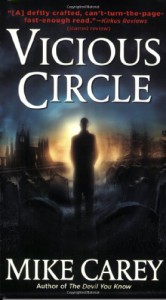

~~Moved from GR~~
Vicious Circle (Felix Castor #2)
by Mike Carey
Something very bad is happening in London, and the rising of the dead is only the start of it. The ghost of a child has been stolen from her parents' home. A man ridden by a demon has become even more disturbingly violent. A local church seems to have been invaded by a dark presence. Ordinary Londoners have suddenly succumbed to bouts of horrific violence.
The end is nigh and the demons have come out to play.
It isn't long before Felix Castor is right in the middle of the game.
Carey's books make for fantastic urban fantasy pulp: strong plots, vivid action, and an engaging narrator. But while this series may be hardboiled urban fantasy, but I would not necessarily recommend it to Dresden Files fans. Castor's world is significantly darker than the Dresdenverse. While Dresden tends towards lightly hardboiled, Castor is pure noir: isolation, moral greys, a cruel world, and a bleak future. While the plot involves demons, it mainly centres around man's inhumanity to man(and /women/children/ghosts) in sickeningly graphic and extremely disturbing detail. Neither the protagonist nor his associates have the sort of clear moral certainty that Dresden usually assumes, and while Butcher's books portray Christianity and the Catholic church positively, Castor's vitriolic hatred of religion fairly drips off the page. The writing is terse and wry and the wordplay is often humorous, but even considering that our dauntless hero is a Liverpudlian who looks like a used car salesman and whose weapon of choice is a bright green recorder, it's amazing how unfunny I find these books. That is absolutely not a complaint; I suspect I have difficulty seeing the funny side because I so quickly became absorbed in the world and plot.
Perhaps the most depressing aspect of the book for me was Fix's isolation. Considering that his closest confidant is the demonic succubus who owns his soul, Castor won't be winning any popularity contests. He goes out of his way to antagonise everyone he encounters, from his supposed friend Nicky to potential information sources to the suspicious policewoman investigating him. He even has the potential to alienate the reader--I found his tendency to boast about his own ignorance while scorning the beliefs of others to be grating, and I suspect it is even more trying for readers of faith. Although I find his actions frustrating, I think Fix's pugnacious attitude can be seen as a masochistic, guilt-ridden attempt to punish himself and keep himself isolated from people that he fears he will fail. For him, hell is indeed himself, always alone, with "nothing to escape from and nothing to escape to."
But even if Fix made an abrupt personality shift into placating cooperation, his world would hardly be less dismal: there are simply too few decent human beings in it. I love that all of Carey's characters are complex mixtures of selfishness, altruism, bravery, and cowardice, but I feel that all of them veer far closer to the monster than the angel. I can count only two human characters who are significant enough to be faced with difficult choices and still seem to make reasonably humane decisions--and that's if you let me use the technically undead Nicky and you let me discount Matthew Castor's hard, unfeeling, holier-than-thou actions from the last book. Castor's (human and still living) "friends" are especially problematic. Fix's cop acquaintance simultaneously calls him "friend" and spinelessly betrays him. I never liked Rafi, Castor's demon-ridden friend, but in this book, we learn more about how he ended up sharing headspace with Asmodeous, and his actions do not reflect well on him. I also revised my opinion of Pen, Castor's (unrequited) love interest: she's not just a vapid, shallow, bimbo; it turns out she's also a selfish, self-righteous, myopic [expletive] as well. All of this goes to create a very dark world; while this was obviously Carey's intention, I tend to shy away from books where the characters are so flawed that they are difficult to empathise with.
Despite my reservations about the characters, I quickly found myself engrossed in the story. Carey's writing is incredibly visual. Maybe his ability to create such vivid scenes stems from his experiences writing for comics and graphic novels, but all of it, especially the demon scenes, go to create a story that is simply crying for someone to take on the movie rights. Carey also shows considerable skill in creating a mystery--I guarantee that you will figure out two parts of it about 100-200 pages before Fix does, which is admittedly frustrating, but there are some marvellous twists and turns at the end that will certainly surprise you.
Carey's worldbuilding continues to delight me; his particular supernatural setup is both incredibly creative and solidly thought out.
Overall, the book is a fine example of dark, gritty, urban fantasy pulp: it is imaginative, suspenseful, often heart-wrenching. If you're in the mood for a world of moral greys, vivid action, and a page-turning plot, Felix Castor is the protagonist for you.
~~Other links~~
My review of The Devil You Know (Felix Castor #1)
My review of Dead Men's Boots (Felix Castor #3)
My review of Thicker than Water (Felix Castor #4)
My review of The Naming of Beasts (Felix Castor #5)

 3
3




